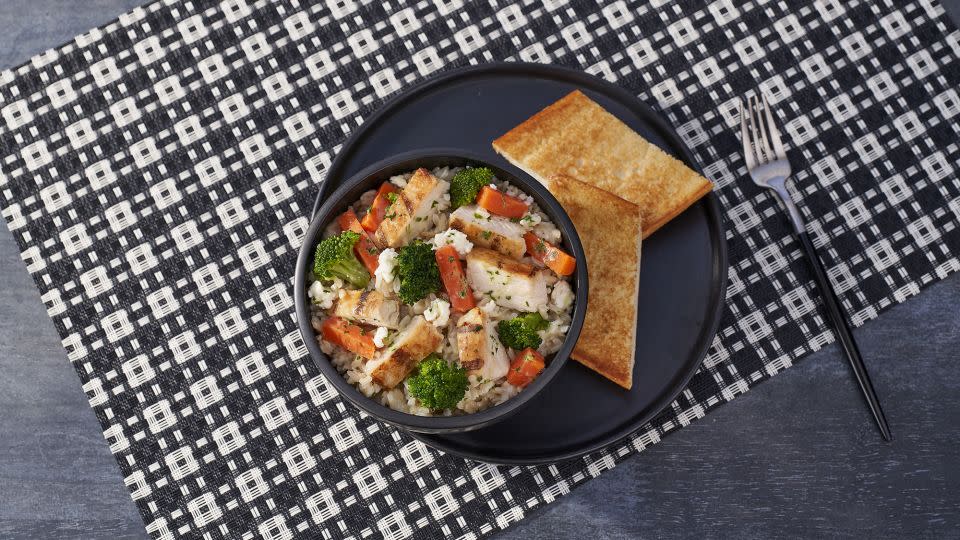Nestlé is releasing a lineup of frozen food for people on Ozempic and other GLP-1 drugs
Nestlé, the maker of frozen food brands like Stouffer’s and DiGiorno, is slimming down with a new line of meals for people taking GLP-1 drugs, such as Ozempic, for weight loss.
The new frozen food brand called Vital Pursuit will consist of 12 portion-controlled meals, high in protein plus fiber, “intended to be a companion for GLP-1 weight loss medication users and consumers focused on weight management,” the company announced Tuesday.
It’s the first brand from Nestlé specifically for people on drugs like Ozempic and Wegovy, joining other companies in expanding to cash in and remain relevant. J.P. Morgan predicts that obesity medication will soon be a $100 billion market and sees about 9% of the US population being on a weight-loss drug by 2030.
The long-term effects of GLP-1s — or glucagon-like peptide 1 agonists — on people’s health remains unclear. However, a recent study on Wagovy significantly reduced heart risk in addition to helping with weight loss. The results showed that the average weight loss for people using the medication was sustained for up to 208 weeks, or four years.
The drugs have changed the way people eat, both in portion sizes and frequency, according to the company. Nestlé North America CEO Steve Presley said in a press release that Vital Pursuit “provides accessible, great-tasting food options that support the needs of consumers in this emerging category.”
A full lineup of Vital Pursuit options was not immediately released, but it will hit grocery stores later this year with a suggested price of $4.99 or less. The meals are made with whole grains or protein pasta and consist of sandwich melts, pizzas and bowls, enriched in nutrients like potassium, calcium and iron that the prescription drug users might miss from eating less food overall.

Adding a brand like this to Nestlé’s portfolio for consumer brands makes sense, according to Neil Saunders, retail analyst and managing director at GlobalData Retail, especially since GLP-1 drugs could be “disruptive” to food manufacturers.
Nestlé also sells Lean Cuisine, a diet-focused frozen food brand launched more than 40 years ago to attract calorie-counting customers, but it’s “seen as old-school” by customers, Saunders told CNN.
“The new brand is positioned as a much more scientific approach with an emphasis on nutrition and balance,” he said. “Nestlé is hoping to gain new customers and widen its audience.”
Companies respond
The sudden rise of GLP-1 drugs is also seen as an opportunity by other companies, like GNC, a once-bankrupt chain that sells vitamins and nutritional supplements. Last month, the retailer announced that it was adding a dedicated section in its US stores with vitamins, protein shakes and supplements tailored to people on GLP-1 medications.
Costco has started offering Ozempic at its US pharmacies through its low-cost health care partner Sesame. The program, launched in April, includes a video consultation with a weight loss doctor or specialist, a GLP-1 or weight loss prescription, if appropriate, and ongoing support through unlimited messaging and guidance with a health care provider.
WeightWatchers launched a membership plan for people that gives members access to doctors who can prescribe these medications. It also made a $100 million-plus deal to buy Sequence, a telehealth business that offers virtual prescriptions to patients for these weight loss drugs where appropriate.
Gyms are also adjusting their strategies as more of their members take medications for weight loss. Luxury gyms, such as Life Time, are acquiring weight loss clinics with doctors who can prescribe GLP-1s, while Equinox debuted a personal training program for members taking GLP-1s to preserve muscle mass.
Food companies, like Nestlé, are also bracing for GLP-1 consumers to buy fewer sugary snacks and drinks. J.P. Morgan last year said that current GLP-1 users purchased around 8% less food — including snacks, soft drinks and high-carb products — over the prior year, compared with consumers who were not on these drugs.
Vital Pursuit “sends a signal to investors and stakeholders that Nestlé is looking at weight-loss drugs and is responding to the opportunity,” Saunders said.
CNN’s Nathaniel Meyersohn contributed to this report.
For more CNN news and newsletters create an account at CNN.com
